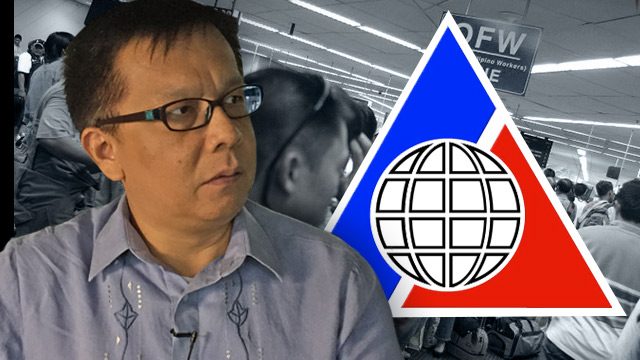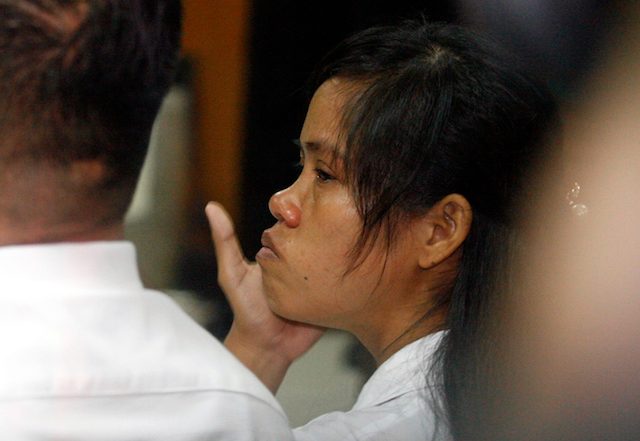SUMMARY
This is AI generated summarization, which may have errors. For context, always refer to the full article.

MANILA, Philippines – The Philippine Overseas Employment Administration (POEA) on Tuesday, April 28, reiterated its warning against illegal recruitment, stressing the links of the underground industry to drug syndicates.
In a statement, POEA chief Hans Leo Cacdac advised Filipinos to never succumb to the false promises of unlicensed recruiters.
While an overseas Filipino worker (OFW) will be able to secure employment abroad some two months faster through the illegal process than the proper channels, the dangers that await are overwhelming and at most times irreparable.
Cacdac said illegally-recruited OFWs end up stranded in foreign land, forced to work against their will in low-paying jobs, at times in establishments in remote areas that are used as front for prostitution rings.
He added that some illegal recruiters and human traffickers now work with drug traffickers, using unsuspecting recruits as drug couriers.
This was the same scheme narrated in the case of Mary Jane Veloso, a Filipina on death row in Indonesia. (READ: The story of Mary Jane Veloso, in her own words)
POEA’s warning – while not explicitly alluding to Veloso’s case – came on the day she was expected to be executed with other drug offenders, a matter that has caused international indignation.
Veloso is a Filipino formerly working as a domestic worker, penalized with death by firing squad over drug smuggling charges. (WATCH: The fate of Mary Jane Veloso)
A high school drop-out and a mother of two, she insists she was framed and duped into unknowingly serving as a drug mule.
During her family’s visit to her isolation room in Indonesia’s Nusakambangan Prison Island, Mary Jane’s words signalled acceptance of her fate despite a strong insistence of innocence.
As part of her last wishes, she said she wanted her body cremated and sent home to the Philippines at the same time her family returns from Indonesia. (READ: Mary Jane Veloso a drug smuggler? Look at our home, parents say)
Veloso had told her two sons to be proud of their mother for bearing the penalty of someone else’s transgression.
(Her execution has since been delayed by the Indonesian government pending a legal action against her illegal recruiter in the Philippines. – Editors)

Prevent another Mary Jane Veloso, senators urge
Even as the world awaited the execution of Veloso and other drug convicts, senators said much could be done to prevent cases like hers in the future.
On Tuesday, senators Cynthia Villar and Nancy Binay urged intensive government assistance to OFWs on death row way ahead of their execution notices.
They said a Filipino’s right to a fair trial knows no geographical boundaries.
Villar said Filipinos who are on trial abroad – regardless of guilt or innocence – deserve the backing of their state. Binay cited the alleged shortfalls in Veloso’s trial, such as the lack of a competent translator, as all the more reason to increase the government’s legal assistance fund for OFWs.
The Department of Foreign Affairs (DFA) said there are some 88 Filipinos on death row abroad, 50% of whom were convicted of drug-related offenses.
“As early as now, we should be exhausting all efforts for the commutation of death sentence to lower penalties for other Filipinos in foreign jails,” Villar said.

Legal assistance fund for OFWs
Both Binay and Villar said they had supported the increase in the legal assistance fund (LAF) for distressed OFWs in the 2015 budget allotted for the DFA – from P30 million to P100 million.
“The LAF is used to pay for the fees for the foreign lawyers, bail bonds, court fees and charges, and other litigation expenses,” Villar said.
Binay explained that the increase was approved during the deliberations on the 2015 national budget, but became subjected to “conditional implementation” in a veto message by President Benigno Aquino III.
“We understand the plight of OFWs in death row and we want them to have access to competent legal assistance so that they can sufficiently defend their case in foreign courts,” Villar said.
“Huwag po nating hayaan na malagay sa alanganin ang buhay nilang mga nagsisikap sa ibang bansa upang maitaguyod ang kanilang mga pamilya,” Binay added. (Let us not let Filipinos who toil in other countries to sustain their families be placed in threatening situations.)
Fight illegal recruiters
Villar highlighted stories of OFWs from the provinces who are duped by illegal recruiters.
The POEA, which is in charge of licensing of recruiters, continues to clamp down on illegal recruiters.
It has an online database of recruiters with their corresponding statuses – whether they are in good standing, delisted, cancelled, forever banned, inactive, revoked, suspended, or denied renewal of permits.
A free POEA mobile app also shows the status of a recruitment agency, active job orders, as well as information about illegal recruitment and how to identify an illegal recruiter. (READ: Tech-based services needed to protect OFWs – research)
Civil society organizations have lamented that the POEA database is belatedly updated and therefore sometimes contains inaccurate information.

Report abuses
As a mechanism for reporting abuses against OFWs, one can call the POEA hotlines at 722-1144 and 722-1155.
These abuses range from passport and/or cellphone confiscation to actual physical assault.
In Veloso’s case, the government has argued that her standing as a victim of human trafficking should have been taken into account by the Indonesian court. Trafficking victims are not meant to doubly suffer by being punished by law with offenses they were forced by traffickers to commit – an argument the Indonesian court disregarded over a technicality.
Reporting suspected cases of human trafficking can be done through any of the following:
- Call or text the Inter-Agency Council Against Trafficking (IACAT) Actionline at 1343. If outside Metro Manila, call (02)1343.
- Access www.1343actionline.ph
- Email 1343actionline@cfo.gov.ph
- Download on Google Play or the Apple App Store the 1343 Actionline mobile app
The Commission on Filipinos Overseas, an IACAT member-agency, is in charge of the hotline.
The Philippines is a known labor-sending country, with over 10.5 million Filipinos either temporarily working or permanently residing overseas.
While OFWs’ remittances are considered a major boost to the economy, the Aquino administration envisions “a government that creates jobs at home so that working abroad will be a choice rather than a necessity.” – Rappler.com
Add a comment
How does this make you feel?
There are no comments yet. Add your comment to start the conversation.